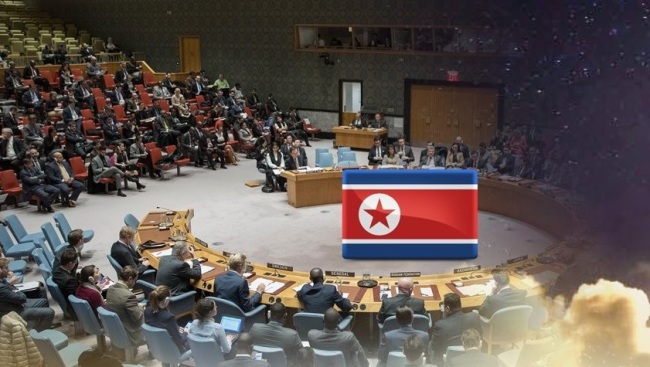In what is generally seen as a bold pre-emptive move, North Korea on Saturday announced its decision to halt nuclear and missile tests and shut down its main nuclear test site -- and instead focus on economic development.
The move took by surprise those who believed the North would slowly and cautiously play out such steps towards denuclearization as a bargaining chip for regime survival, through the two landmark summits planned between South Korea and the United States.
Pyongyang may have a slew of underlying motives, but experts saw its decision to shift its focus to the economy as an indirect demand to the US to alleviate or even completely lift layers of sanctions imposed against the nation.
“The lifting of sanctions will play a key part in the North’s new economic development policy,” said Shin Beom-chul, a senior fellow at the Asan Institute for Policy Studies.
“Saturday’s announcement in a way showed the North’s willingness to obtain sanctions relief and security assurances, ahead of key summits,” he added, alluding to the fact that the sanctions are a major obstacle in the North’s new economic drive.
Although North Korea remains tight-lipped on the impact of the pressure campaign, analysts have pointed to growing signs of economic struggle under the latest round of international sanctions prompted by the North’s relentless nuclear and missile tests in recent years.
Last year, the North conducted its sixth and largest nuclear test in September and has fired 23 missiles in 16 tests since February, which triggered the United Nations to slap crippling sanctions against the rogue regime on different occasions.
Despite the technological advancement displayed with each launch, it also broadened the wedge with China, its sole ally that accounts for 90 percent of its trade volume.
Kim Byung-yeon, a Seoul National University Professor, said that North Korea’s heavy trade dependency has made the country more vulnerable to international sanctions, at The Korea Herald’s “Korean Peninsula at a Crossroads” forum last week.
According to the North Korean economy expert, if sanctions are fully implemented this year, North Korea would further lose a large chunk of its trade. Such a grim forecast likely pushed Kim Jong-un to the negotiation table with the US, he added.
However, overall, experts said that it may be too early for the North to see noteworthy sanctions alleviation, as more solid progress in denuclearization has to be unveiled in the steps leading to and after the US-North Korea summit.
There is also the lingering doubt whether the North‘s announcement means it would dismantle its nuclear program, whose completion Kim first declared at the beginning of this year.
“The steps North Korea will take towards ‘denuclearization’ will determine the level of sanctions alleviation -- key steps and questions, including suspension of all nuclear facilities within the country or how North Korean will enter negotiations, remain unsolved and unanswered,” Koh Yu-hwan, a North Korea expert at Seoul‘s Dongguk University who’s advising Moon on his summit with Kim, said.
The US continues to hail its policy of maximum pressure and whether North Korea will win the support of other nations, is another matter entirely.
US Treasury Secretary Steven Mnuchin said Saturday that the maximum pressure campaign will continue until the North abandons its nuclear weapons program in a verifiable way.
In Sweden, US ambassador to the United Nations Nikki Haley credited the North Korean move as evidence of the success of the “maximum pressure” policy pursued since President Trump took office.
China’s state-run Global Times newspaper, on the other hand, called on Japan, South Korea and the US to immediately lift all unilateral sanctions on North Korea, while Foreign Ministry spokesman Lu Kang said in a statement that Kim’s promises would help promote a political settlement to the tensions.
Kim met with Chinese leader Xi Jinping last month in Beijing, where he asked South Korea and the US to take progressive and synchronous measures in achieving denuclearization. The US meanwhile, has been calling for “complete, verifiable and irreversible dismantlement” of nuclear arms.
Japan, however, responded in a relatively lukewarm manner, with Prime Minister Shinzo Abe saying that Kim’s pledge wouldn’t change how Japan handles the regime, according to Kyodo News.
The North is scheduled to hold a summit with the South at the truce village of Panmunjeom on Friday, which is expected to be followed by a sit-down with the US in May or June.
By Jung Min-kyung (
mkjung@heraldcorp.com)








